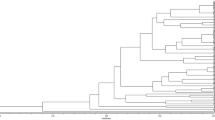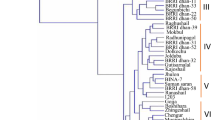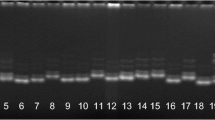Summary
Enzyme variation detected by starch gel electrophoresis was used to investigate the genetic structure of Oryza sativa L. species. Fifteen polymorphic loci coding for 8 enzymes were surveyed among 1688 traditional rices from Asia. Multivariate analysis of the data resulted in identification of six varietal groups, with two major ones, groups I and VI, two minor ones, groups II and V, and two satellite ones, groups III and IV. Group I is found throughout tropical Asia; it encompasses most Aman rices in Bangladesh, the Tjereh rices in Indonesia and the Hsien rices in China. Group VI is found mostly in temperate regions and in high elevation areas in the tropics; it encompasses most upland rices from Southeast Asia, the Bulu rices from Indonesia and the Keng rices from China. Groups II, III, IV and V share common differences from groups I and VI which suggest an alternative evolutionary history. Groups II and V are found in the Indian subcontinent from Iran to Burma. Well-known components of these are Aus rices from Bangladesh for group II and Basmati rices from Pakistan and India for group V. Groups III and IV are restricted to some deepwater rices in Bangladesh and Northeast India. Based on analogy with other classifications, Group I might be considered as the “Indica” type and Group VI as the “Japonica” type. Such terms, however, have a depreciated meaning due to discrepancies among various classifications.
Similar content being viewed by others
References
Chang TT (1976) The origin, evolution, cultivation, dissemination and diversification of Asian and African rices. Euphytica 25:425–441
Chang TT, Bardenas EA (1965) The morphology and varietal characteristics of the rice plant. IRRI Tech Bull 4, 40 pp
Cheng KS, Wang XK, Zhou JW, Lu YX, Lou J, Huang HW (1984) Studies on indigenous rices in Yunnan and their utilization. 2. A revised classification of Asian cultivated rice (in Chinese). Acta Agron Sin 10:271–280
Chu YE (1967) Variations in peroxidase isozymes of Oryza perennis and O. sativa. Jpn J Genet 42:233–240
Engle LM, Chang TT, Ramirez DA (1969) The cytogenetics of sterility in F1 hybrids of Indica x lndica and Indica × Javanica varieties of rice (Oryza sativa L.). Philipp Agric 53:289–307
Fu PY, Pai C (1979) Genetic studies on isozymes in rice plant. 2. Classification and geographical distribution of cultivated rice through isozyme studies (in Chinese with English summary). J Agric Assoc China 107:1–16
Glaszmann JC (1985) A varietal classification of Asian cultivated rice (Oryza sativa L.) based on isozyme polymorphism. In: Rice genetics. International Rice Research Institute, Manila, Philippines, pp 83–90
Glaszmann JC, Benoit H, Arnaud M (1984) Classification des riz cultivés (Oryza sativa L.). Utilisation de la variabilité isoenzymatique. Agron Trop (Paris) 39:51–66
Husain I, Akbar M (1981) Genetic conservation of rice in Pakistan. Pakistan J Agric Res 2:64–67
IBPGR-IRRI Rice Advisory Committee (1980) “Descriptors for rice” (Oryza sativa L.). IRRI, Los Baños, Philippines
Jacquot M, Arnaud M (1979) Classification numérique de variétiés de riz. Agron Trop (Paris) 33:157–173
Kato S, Kosaka H, Hara S (1928) On the affinity of rice varieties as shown by the fertility of rice plants. Centr Agric Inst Kyushu Imp Univ 2:241–276
Matsuo T (1952) Genecological studies on cultivated rice (in Japanese). Bull Nat Inst Agric Sci Jpn D 3:1–111
Morinaga T (1954) Classification of rice varieties on the basis of affinity. In: International Rice Commission, Working Party on Rice Breeding. Rep 5th Meeting, pp 1–14
Morinaga T (1968) Origin and geographical distribution of Japanese rice. JARQ 3:1–5
Morishima H, Oka HI (1981) Phylogenetic differentiation of cultivated rice. 22. Numerical evaluation of the Indica Japonica differentiation. Jpn J Breed 31:402–413
Nakagahra M (1977) Genic analysis for esterase isozymes in rice cultivars. Jpn J Breed 27:141–148
Nakagahra M, Akihama T, Hayashi KI (1975) Genetic variation and geographic cline of esterase isozymes in native rice varieties. Jpn J Genet 50:373–380
Nei M (1975) Molecular population genetics and evolution. Elsevier, New York
Oka HI (1958) Intervarietal variation and classification of cultivated rice. Indian J Genet Plant Breed 18:79–89
Oka HI (1983) The Indica-Japonica differentiation of rice cultivars — A review. In: Proc 4th Int SABRAO Cong, pp 117–128
Oka HI, Chang WT (1962) Rice varieties intermediate between wild and cultivated forms and the origin of the Japonica type. Bot Bull Acad Sin 3:109–131
Pai C, Endo T, Oka HI (1973) Genic analysis for peroxidase isozymes and their organ specificity in Oryza perennis and O. sativa. Can J Genet Cytol 15:845–853
Pai C, Endo T, Oka HI (1975) Genic analysis for acid phosphatase isozymes in Oryza perennis and O. sativa. Can J Genet Cytol 17:637–650
Richharia RH (1957) Plant breeding and genetics in India, 2nd edn. Scientific Books, Patna
Second G (1982) Origin of the genic diversity of cultivated rice (Oryza spp.): study of the polymorphism scored at 40 isozyme loci. Jpn J Genet 57:25–57
Second G, Trouslot P (1980) Polymorphisme de 13 zymogrammes observés parmi diverses espèces sauvages et cultivées du genre Oryza. In: Electrophorèse d'enzymes de riz. Travaux et documents de l'ORSTOM, 120, ORSTOM, Paris
Shahi BB, Morishima H, Oka HI (1969) A survey of variations in peroxidase, acid phosphatase and esterase isozymes of wild and cultivated Oryza species. Jpn J Genet 44:303–319
Terao H, Mizushima U (1942) Some considerations on the classification of Oryza sativa L. into two subspecies, socalled Japonica and Indica. Jpn J Bot 10:213–258
Virmani SS, Chaudhary RC, Khush GS (1981) Current outlook on hybrid rice. Oryza 18:67–84
Author information
Authors and Affiliations
Additional information
Communicated by G.S.Khush
Joint contribution: Institut de Recherches Agronomiques Tropicales et des Cultures Vivrières, 45 bis avenue de la Belle Gabrielle, F-94736 Nogent Sur Marne Cedex, France, and International Rice Research Institute P.O. Box 933, Manila, Philippines
Rights and permissions
About this article
Cite this article
Glaszmann, J.C. Isozymes and classification of Asian rice varieties. Theoret. Appl. Genetics 74, 21–30 (1987). https://doi.org/10.1007/BF00290078
Received:
Accepted:
Issue Date:
DOI: https://doi.org/10.1007/BF00290078




